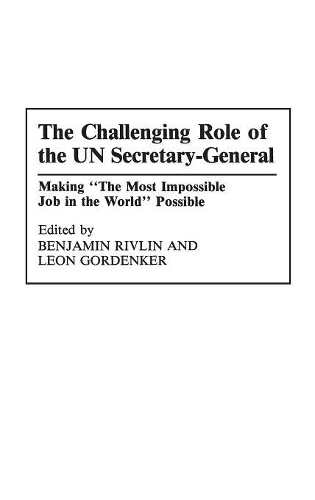
The Challenging Role of the UN Secretary-General: Making The Most Impossible Job in the World Possible
(Hardback)
Publishing Details
The Challenging Role of the UN Secretary-General: Making The Most Impossible Job in the World Possible
By (Author) Leon Gordenker
By (author) Benjamin Rivlin
Bloomsbury Publishing PLC
Praeger Publishers Inc
30th April 1993
United States
Classifications
Tertiary Education
Non Fiction
341.23092
Physical Properties
Hardback
320
Width 156mm, Height 235mm
595g
Description
How has the role of the United Nations and its Secretary-General changed with the end of the Cold War, and with the beginning of a New World Order These questions are increasingly significant as the threat of nuclear-bloc confrontation is replaced by ethnic tensions and civil conflicts. In this study of the office of the UN Secretary-General in this new era, Rivlin and Gordenker bring together leading scholars and practitioners to analyse these issues. The 15 essays in this volume discuss the new complexity and salience of the role of the UN Secretary-General and its current incumbent, Boutros Boutros-Ghali. Not only is the role analysed in relationship to a rapidly changing climate of world politics, but it is also examined in relationship to the backgrounds and experiences of the earlier Secretaries-General from Trygve Lie, Dag Hammarskjold, U Thant, and Kurt Waldheim, to Javier Perez de Cuellar. All those concerned with the UN, international organisations, and international administration should find this volume interesting reading.
Author Bio
BENJAMIN RIVLIN is Director of the Ralph Bunche Institute on the United Nations and Professor Emeritus of Political Science at the City University of New York. He is the author and editor of Ralph Bunche: The Man and His Times (1990), The Contemporary Middle East: Tradition and Innovation (1965), and The United Nations and the Italian Colonies (1950). LEON GORDENKER is Professor Emeritus of International Relations at Princeton University and Senior Research Fellow at the Ralph Bunche Institute on the United Nations. He is the author of The UN Secretary-General and the Maintenance of International Peace (1967), Refugees in International Politics (1987), and The United Nations in the 1990s (with P. R. Baehr) (1992).
